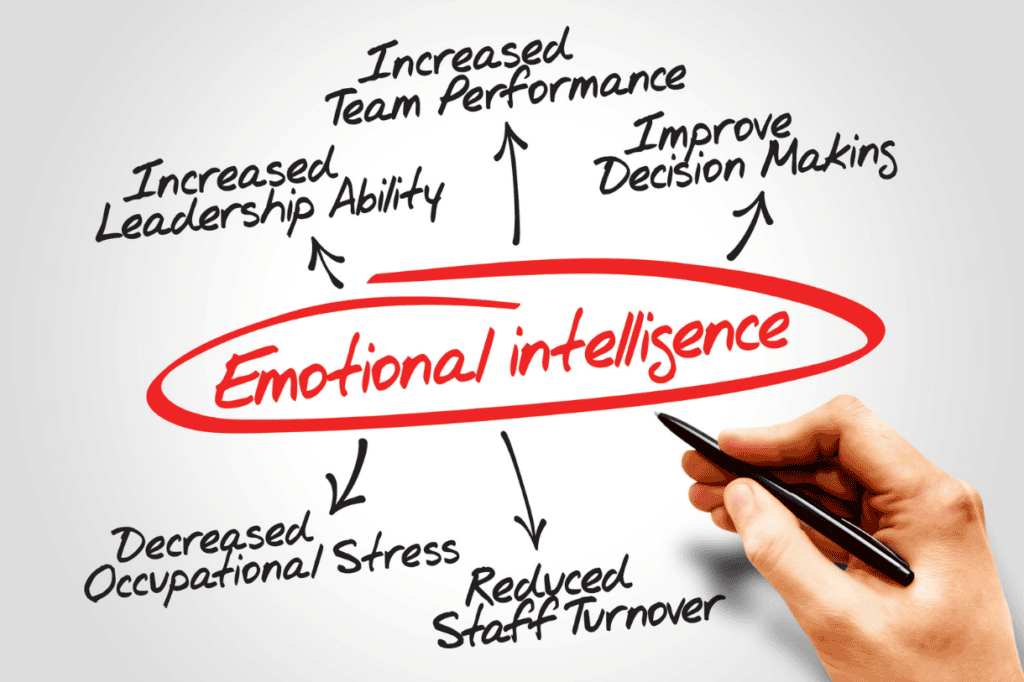Emotional intelligence (EI) is essential for successful leadership. In today’s complex and dynamic work environments, technical skills alone are no longer sufficient for those who aspire to lead effectively.
Leaders who possess emotional intelligence are well-versed in managing relationships, understanding the emotions of others, and navigating the challenges that come with leadership roles. This ability to connect on a deeper level with team members, stakeholders, and clients is what sets exceptional leaders apart from the rest.
In the context of career advancement, developing emotional intelligence can significantly enhance an individual’s ability to succeed. Those with high EI are more adept at building strong teams, resolving conflicts, and fostering a positive work environment—all of which are crucial for climbing the career ladder.
This article explores the importance of emotional intelligence in leadership.
The Importance of Emotional Intelligence in Leadership
Emotional intelligence components of EI include self-awareness, self-regulation, empathy, social skills, and motivation. These elements work together to help leaders navigate complex interpersonal dynamics, make informed decisions, and lead with compassion and understanding.
Leaders with strong emotional intelligence are more likely to create a work environment where employees feel valued, understood, and motivated to perform their best.
In leadership roles, emotional intelligence plays a pivotal role in how effectively a leader can manage their team and achieve organizational goals. Leaders who are self-aware and able to regulate their emotions can handle stressful situations with composure. Furthermore, empathy allows leaders to understand and respond to the needs and concerns of their team members.

Developing Emotional Intelligence in Nurse Leaders
Nurse leaders operate in environments that are often high-pressure and emotionally charged. They’re responsible for managing patient care and leading a team of healthcare professionals who are frequently working under stress. In such settings, emotional intelligence becomes an essential tool for effective leadership.
Nurse leaders with high EI are better able to empathize with patients and staff, manage the emotional demands of their roles, and create a supportive and positive work environment. In turn, this leads to better patient outcomes, improved team cohesion, and a more resilient healthcare workforce.
Advanced education plays a crucial role in helping nurse leaders develop emotional intelligence. Programs like online accelerated BSN provides a comprehensive curriculum that equips nurses with the leadership skills necessary to excel in their roles.
These programs often include components focused on communication, conflict resolution, and team management—all of which are integral to developing emotional intelligence. Plus, the flexibility of online programs allows working nurses to pursue further education without sacrificing their current responsibilities.
Integrating Emotional Intelligence into Leadership Development
Incorporating emotional intelligence into leadership development is essential for those aspiring to advance in their careers. Advanced education programs, particularly those tailored for leadership roles, often include specific training on emotional intelligence. These programs teach future leaders how to become more self-aware, manage their emotions effectively, and develop empathy for others.
Through experiential learning methods, such as simulations and case studies, these programs provide practical opportunities for individuals to apply EI concepts in real-world scenarios. This hands-on approach not only reinforces the theoretical aspects of emotional intelligence but also helps learners build the confidence needed to implement these skills in their daily interactions.
Continuous development of emotional intelligence is vital, as it is not a skill that is mastered overnight. Leaders must engage in ongoing education and reflective practices to refine their emotional intelligence. It might include seeking feedback from peers and mentors, practicing mindfulness, and regularly assessing their emotional responses to various situations.
The Role of Mentorship in Fostering Emotional Intelligence
Mentorship is a powerful tool in the development of emotional intelligence for leaders. A mentor who exemplifies strong emotional intelligence can guide emerging leaders through the complexities of managing emotions in the workplace.
This guidance is particularly valuable in helping leaders navigate challenging situations that require a high degree of empathy, self-awareness, and effective communication. Through mentorship, leaders can observe and learn how to handle emotional triggers, maintain composure under pressure, and respond to the needs of their team in a balanced and thoughtful manner.
In addition to learning from observation, mentees can benefit from direct feedback and personalized advice from their mentors. This feedback is crucial for self-improvement, as it allows leaders to understand how their emotional responses and interpersonal interactions are perceived by others.
With this insight, they can make the necessary adjustments to improve their leadership effectiveness. Moreover, the mentor-mentee relationship itself fosters the development of social skills, as it requires clear communication, trust, and mutual respect—key components of emotional intelligence.
Leveraging Emotional Intelligence for Career Advancement
Leaders who possess high EI are more adept at building and maintaining strong professional relationships, which are essential for career advancement. These leaders are often seen as more approachable, trustworthy, and effective. They can inspire and motivate their teams, manage conflicts with diplomacy, and adapt to changing circumstances with resilience. As a result, leaders with high emotional intelligence are more likely to be considered for promotions and leadership roles within their organizations.
Furthermore, the ability to leverage emotional intelligence can set leaders apart in competitive environments. In many cases, technical skills and experience may be comparable among candidates vying for the same position, but those with higher EI can distinguish themselves by demonstrating superior leadership qualities.
Employers increasingly recognize the value of emotionally intelligent leaders in driving team performance, enhancing employee engagement, and fostering a positive organizational culture. Consequently, leaders who invest in developing their emotional intelligence are better positioned to advance in their careers and take on more significant responsibilities.

Challenges in Cultivating Emotional Intelligence
One of the primary obstacles in cultivating EI is overcoming ingrained habits and behaviors that may not align with emotionally intelligent leadership. For example, leaders who are accustomed to making decisions quickly without considering the emotional impact on their team may find it difficult to shift towards a more empathetic approach.
Additionally, a lack of self-awareness can hinder the development of EI, as it prevents leaders from recognizing their emotional triggers and understanding how their behavior affects others. Overcoming these challenges requires a commitment to personal growth and a willingness to engage in self-reflection and continuous learning.
Another challenge in cultivating emotional intelligence is the time and effort required to develop these skills. Unlike technical skills, which can often be learned through straightforward instruction and practice, emotional intelligence requires ongoing attention and practice. Leaders must be willing to invest time in activities that enhance their self-awareness, such as mindfulness exercises, seeking feedback, and engaging in reflective practices.
Additionally, developing empathy and social skills may require leaders to step outside their comfort zones and engage with people and situations that challenge their emotional responses.
Through advanced education, mentorship, and a commitment to continuous learning, leaders can develop the emotional intelligence necessary to excel in their roles. Although developing high EI may present challenges, the rewards—both in terms of personal growth and professional success—are substantial.


